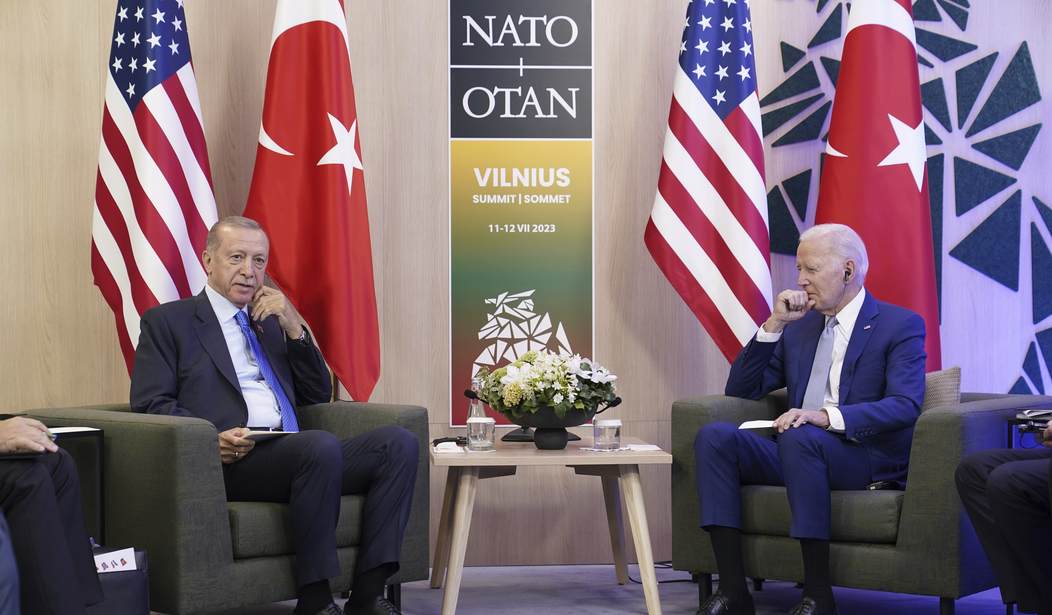The NATO Summit held in Vilnius was a predetermined success from the moment it was announced. But the wheeling and dealing that happened between NATO members in order to achieve that outcome will have far-reaching repercussions for the alliance and for individual members.
The most important result from the Summit happened on the sidelines. Turkish President Recep Tayyip Erdogan finally dropped his opposition to Sweden’s membership after months of delay. The reason Erdogan finally gave in was due to the approval by Joe Biden of the sale of F-16s to Turkey.
Well, not really. White House National Security advisor Jake Sullivan solemnly swears there was no quid pro quo of jets for Turkey’s affirmative vote for Sweden to join the alliance. But if you believe that, I’ve got a drawbridge over the Chicago River I can let you have for a song.
Erdogan had originally asked for the F-16s in 2021. But Ankara was under sanction at the time for its 2017 purchase of Russia’s S-400 air-defense system. There was also criticism of Turkey’s human rights violations that led to cooling relations between the NATO members.
But Erdogan bided his time and was able to secure the warplanes without giving up much at all. His opposition to Sweden joining NATO had to do with Stockholm’s hosting several groups of Kurdish separatists. It was a domestic political problem for Erdogan that he was loathe to confront until he had to.
Not mentioned in the White House readout of his sideline meeting with Erdgoan in Vilnius was that once again, the U.S. has thrown the Kurds under the bus. Those F-16s will come in handy when Turkey bombs Kurdish positions in Northern Turkey — not all of which are PKK terrorists.
Besides that, Erdogan originally wanted to trade Turkey’s entry into the European Union for an affirmative vote allowing Sweden to join the alliance.
President Recep Tayyip Erdogan’s suggestion that he might lift his veto on Sweden’s accession to the North Atlantic Treaty Organization in exchange for Turkey’s admission to the European Union was the baldest blackmail — it deserved no consideration, never mind consent. Even though a breakthrough on Sweden seems to have been achieved, Erdogan’s EU proposition should be taken by the US and its European allies as further proof that Turkey’s president is not a reliable ally within multilateral organizations.
“First come and open the way for Turkey in the EU; after that, we’ll open the way for Sweden just like we did for Finland,” Erdogan told a press conference in Istanbul before leaving for NATO’s summit. That ham-handed attempt at blackmail didn’t sit well with many alliance members.
The second major issue the alliance faced in the lead-up to the Summit was answering the question of what should be done about Ukraine’s desire for membership in the alliance.
Despite a full-court press by Ukraine’s President Volodymyr Zelenskyy, pressuring the U.S., Germany, and other NATO members to at least come up with a timeline that would inevitably lead to Ukraine’s NATO membership, the alliance turned Zelenskyy down. One concession they made was an agreement to drop the procedural need for a formal membership action plan (MAP).
But Zelenskyy rightly sees the vagueness of the alliance’s promises as a bargaining chip for the peace negotiations.
Ukraine has demanded a concrete timeline for NATO membership, pushing members to commit to specific steps for making that happen. But many NATO countries are cautious about risking direct war with Russia, and they are searching for a way to balance Ukraine’s hopes with pragmatic security calculations.
Zelensky’s angry intervention — which came before the final agreement on Tuesday but after the language had already started circulating — suggested the alliance had not yet found a way to satisfy both sides. NATO diplomats had hoped to issue a unified declaration on Ukraine’s membership prospects on Tuesday asa triumphal moment ahead of Zelensky’s visit to the summit.
There’s also the question of why Russia should even bother to negotiate peace when Ukraine is set to join the alliance after the end of hostilities. Zelenskyy knows that Ukraine will be under constant threat of war after the fighting stops, and he wants NATO’s security umbrella to prevent that.
But Zelenskyy is bound to be disappointed. Russian President Vladimir Putin made Ukraine’s membership in NATO a casus belli for the invasion and isn’t likely to accept Ukraine’s NATO membership under any circumstances.
That means another “Forever War” for the United States and the growing possibility that the U.S. will be sucked into the conflict.










